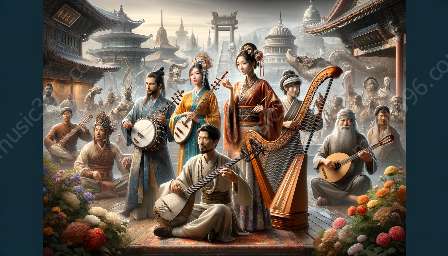Asian music is a fascinating sphere of cultural and artistic expression that reflects the rich tapestry of emotions prevalent in societies across the continent. The interplay of emotions with musical traditions in Asia has not only given rise to distinctive musical forms but has also influenced world music through its profound emotional resonance.
The Cultural Significance of Emotions in Asian Music
Emotions are deeply embedded in Asian musical traditions, serving as a powerful conduit for expressing the full spectrum of human experiences. In traditional Chinese music, for example, the expression of emotions such as joy, sorrow, and nostalgia is central to compositions, with each note and rhythm carefully crafted to evoke specific emotional responses. Similarly, in Indian classical music, the concept of rasa, or emotional essence, plays a pivotal role, allowing musicians to convey complex emotions through raag-based compositions.
Asian music also reflects the cultural, philosophical, and spiritual dimensions of emotions, drawing from ancient traditions that emphasize a holistic understanding of human experiences. For instance, the emotive depth of Japanese traditional music, including Noh and Kabuki theater music, is deeply rooted in Shinto and Buddhist philosophies, evoking profound emotions tied to nature, spirituality, and the human condition.
Expressive Techniques in Asian Music
Asian music employs a myriad of expressive techniques to convey emotions, with instrumental and vocal styles that are inherently intertwined with cultural narratives and societal values. In the context of world music, the emotional resonance of Asian musical forms has transcended geographical boundaries and captured the attention of global audiences.
Influences on World Music
Asian music's emotional depth and cultural significance have left an indelible mark on world music, shaping global trends and inspiring cross-cultural collaborations. From the haunting melodies of the sitar in Indian classical music to the intricately emotive movements of traditional Korean court music, the impact of Asian musical emotions on world music is unmistakable.
The Global Impact of Asian Musical Emotions
With the growing appreciation for cultural diversity and cross-cultural exchange, the emotional cadence of Asian music continues to resonate on the world stage, enriching the global musical landscape with its depth and evocative power. Contemporary Asian artists, drawing on ancient musical traditions, infuse their compositions with a renewed sense of emotional resonance, fostering a dynamic dialogue between traditional and modern expressions.
- Conclusion
- Emotions have always been at the heart of Asian music, shaping its cultural significance and influencing global musical sensibilities. By delving into the intricate tapestry of emotions woven into the fabric of Asian musical traditions, we gain a deeper appreciation for the emotional universality of music and its enduring impact on world music.










































